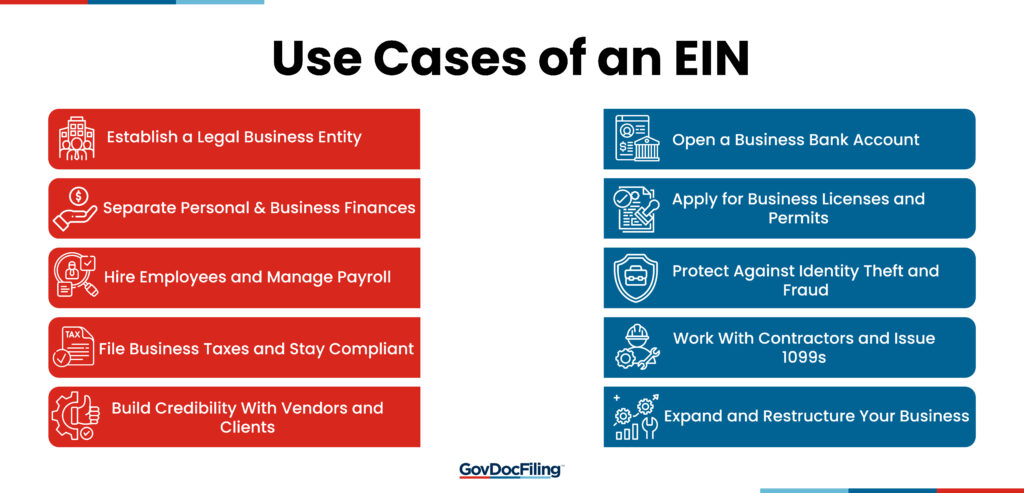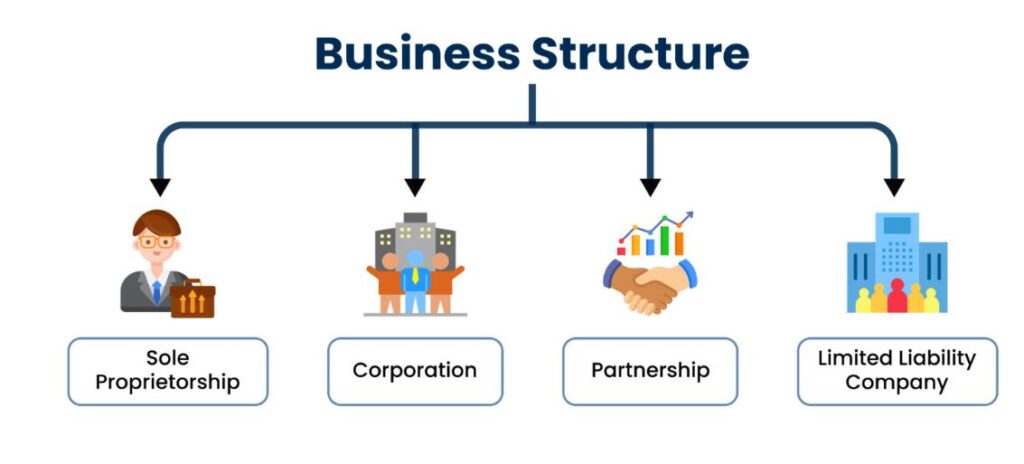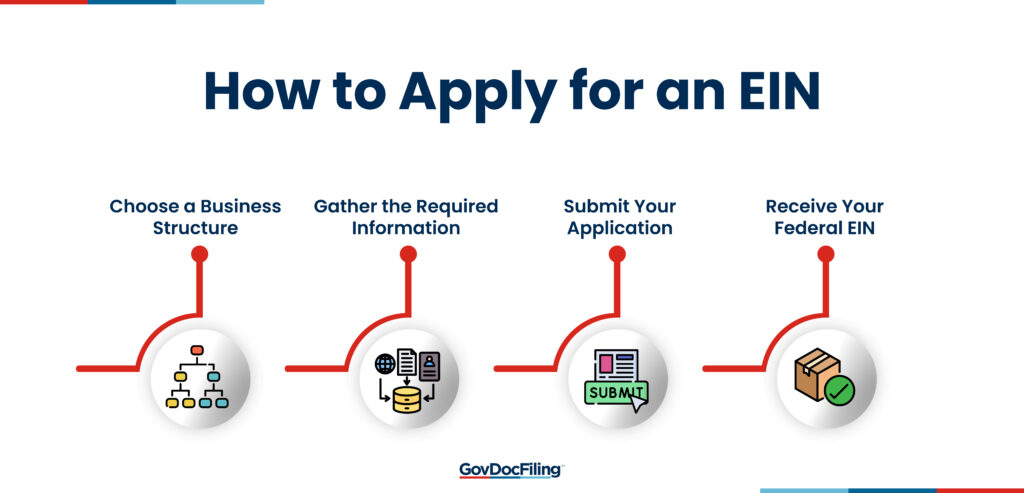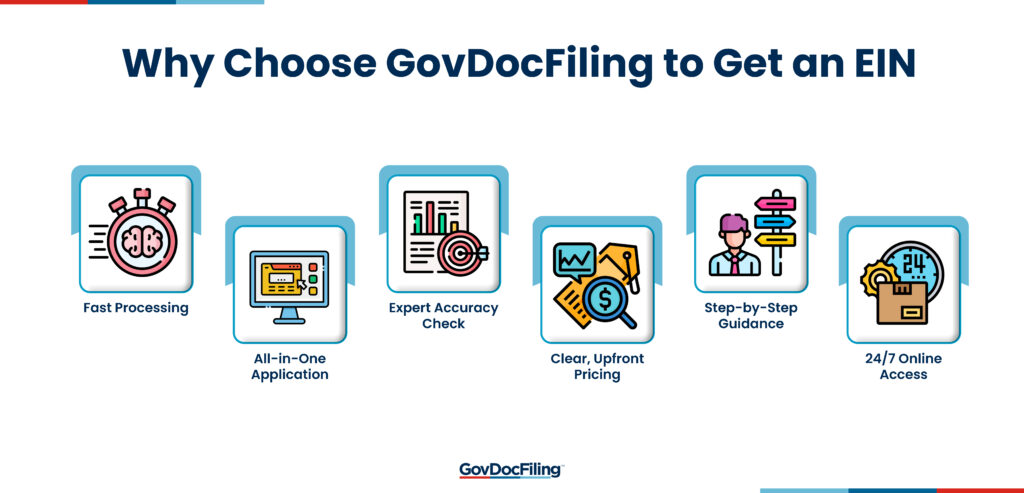An Employer Identification Number (EIN) is like a passport for your business. Without it, you can’t operate fully. Banks, the IRS, vendors, and even employees see it as proof that your company is legitimate and officially recognized.
As more people start businesses each year, an EIN has never been more essential. In fact, the U.S. Census Bureau reported that in 2024, over 5.5 million new business applications were filed — each one needing an EIN.
In this guide, we’ll answer the question: What is an Employer Identification Number? Who needs it, and why? We’ll discuss the purpose of an EIN and how to apply for one.
Let’s get started.
What Is an Employer Identification Number (EIN)?
An Employer Identification Number (EIN) is a nine-digit number issued by the Internal Revenue Service (IRS). It works like a Social Security Number, but for businesses.
While your SSN identifies you personally, the purpose of an EIN is to identify your company for tax and legal purposes. The EIN is a federal tax identification number that helps the government, banks, and financial institutions recognize your business.
Unlike other tax IDs, an EIN is strictly for businesses, not individuals. It is the backbone of business identity in the US. This number remains with your company throughout its entire existence, even if ownership changes.
In 2024, the IRS processed over 432,000 EIN applications via Form SS-4, highlighting a surge in new business formations across the US. The number grows each year as more people start LLCs, corporations, and side hustles.

Image via The U.S. Census Bureau
People often ask, Is an EIN the same as a tax ID? An EIN is a tax ID, but not all tax IDs are EINs. The purpose of an EIN is simple: it gives your business an official identity. With an EIN, you can:
- Hire employees and stay compliant with payroll tax reporting
- Open business bank accounts and apply for credit
- File state and federal tax returns
- Build a business credit history, separate from your personal credit
- Work with vendors, contractors, and government agencies
In simple terms, the purpose of an EIN is to keep your business separate, secure, and compliant. Having an EIN is no longer optional for businesses.
Also Read:
- What Is a Tax ID? Entrepreneur’s Guide to Employer’s Tax ID
- Freelance LLC Guide: Everything You Should Know
What Is the Purpose of an EIN?
While many business owners first encounter the Employer Identification Number during tax season, the purpose of an EIN goes far beyond simply filing tax returns. Having an EIN is a legal requirement for nearly every stage of business.
It’s essential whether you’re starting a new business, operating as a sole proprietor, forming an LLC, or expanding a corporation. Below is a comprehensive breakdown of the purpose of an EIN and its benefits.

1. Establish a Legal Identity for Your Business
The EIN functions as the official federal ID number for your business, similar to how a Social Security Number identifies an individual. It formally distinguishes your business as a legal and financial entity in the eyes of the IRS, banks, and government agencies.
The purpose of an EIN extends beyond tax filing. It is essential when you first apply for LLC formation. Sole proprietorships may also apply for tax ID numbers. While it initially serves as a tax identifier, it becomes essential in other aspects of running a business.
2. Separate Personal and Business Finances
Without an EIN, you might mix personal and business money. That creates confusion during tax season. It also makes bookkeeping a nightmare. When you use an EIN, the IRS knows they are dealing with your business, not you personally.
One purpose of an EIN is to keep your personal and business finances separate. Without one, you may be forced to use your Social Security Number (SSN) for business-related transactions, increasing the risk of financial confusion or liability.
3. Hire Employees and Manage Payroll
If you plan to hire even one worker, you are required to have an employer identification number. Every time you pay wages, you also need to withhold federal and state taxes. An Employer Identification Number makes sure those payments are tracked correctly.
You also need an EIN if you want to offer benefits, such as health insurance or retirement plans like a 401(k). In this case, the purpose of an EIN is to keep payroll records separate from the business owner’s personal tax records.
4. File Business Taxes and Stay Compliant
Filing tax returns can be particularly stressful for new business owners, and the purpose of an EIN is to simplify the process. The IRS uses the EIN to track payroll and income taxes, making tax filing more organized and efficient for your business.
Even sole proprietors often apply for an EIN. The purpose of an EIN in this case is to avoid using their Social Security Number. It helps them meet federal and state tax obligations, and is necessary for accessing most tax credits and other financial benefits.
5. Build Credibility With Vendors, Clients, and Partners
Imagine trying to set up an account with a supplier, and then they ask for your EIN. If you don’t have one, they might view your company as unserious. Many vendors, contractors, and partners are required to have an EIN before conducting business.
Having an EIN also builds trust. Vendors see it as proof that your business is registered and compliant with tax laws. The purpose of an EIN here is to confirm that you have a legitimate business that can be paid and reported for tax purposes.
6. Open Business Bank Accounts and Secure Financing
Most banks require an EIN to open a business bank account. Financial institutions also need your EIN to check your financial history when you apply for loans or credit cards. Lenders and banks often view businesses with an EIN as legitimate.
Without an EIN, you would need to use your Social Security Number, which blurs the line between personal and business finances. The purpose of an EIN isn’t just for tax filing; it’s essential for accessing several financial benefits.
7. Apply for Licenses and Permits, and Certifications
Many local, state, and federal agencies ask for an EIN when issuing business licenses or permits. It’s often required for regulatory compliance in specific industries. In some cases, applications may be delayed or denied without a valid EIN.
The purpose of an EIN here is to verify your business as a legal entity. With an EIN, you can streamline applications for sales tax permits, professional licenses, and industry-specific certifications.
8. Protect Against Identity Theft and Fraud
Another purpose of an EIN is to protect your Social Security Number from being overused. If criminals have access to your EIN, they can open accounts, apply for loans, or commit fraud using your identity.
An EIN adds an extra layer of security when completing contracts, applications, or tax forms. Unlike your personal SSN, your EIN acts as a shield. It helps keep your business information secure and prevents fraud that could harm your finances.
9. Work With Contractors and Issue 1099s
If you hire freelancers or independent contractors, the IRS requires you to issue Form 1099. You need an EIN to prepare these forms and keep tax reporting accurate. Every time you pay wages, you also need to withhold federal and state taxes.
You also need an Employer Identification Number if you want to offer benefits, such as health insurance or retirement plans. The purpose of an EIN is to keep payroll records separate from the business owner’s personal tax records.
10. Expand and Restructure Your Business
The purpose of an Employer Identification Number extends into areas that support growth and everyday operations. An EIN makes it easier to expand into new states, open additional locations, or form multiple LLCs under one ownership structure.
It also plays a role in mergers and reorganizations. Without an EIN, handling multi-state taxes and legal requirements would be much more complicated. An EIN helps create a clear, consistent identity for your business across different agencies and jurisdictions.
Also Read:
- Sole Proprietorship vs. LLC: Everything You Need to Know
- When and How Should You Start Multiple LLCs? A Guide
Who Needs an EIN?
Now that you understand the purpose of an EIN, the next step is determining whether your business actually needs one. Not all businesses are required to have an Employer Identification Number (EIN), but many are, particularly as they expand or assume new responsibilities. The EIN requirement depends on your business structure.
Here’s a quick look at the most common business structures.

Image via GovDocFiling
Entities such as Limited Liability Companies (LLCs), corporations, partnerships, nonprofits, estates, and trusts need an Employer Identification Number. However, other structures may need one under specific circumstances.
For example, sole proprietors don’t need an EIN unless they plan on hiring employees or the owner doesn’t want to use their SSN. In these cases, obtaining an EIN helps maintain privacy and meet IRS requirements.
You must obtain an EIN if your business meets any of the following conditions:
- You hire or plan to hire employees
- You operate as a partnership or corporation
- You form an LLC with more than one member, or elect to be taxed as a corporation
- You withhold taxes on income other than wages paid to a non-resident alien
- You have a retirement plan for employees
- You’re involved in certain types of organizations, such as estates, trusts, or nonprofits
- You need to open a business bank account that requires an EIN
- You want to protect your SSN when dealing with vendors or clients
Understanding the purpose of an EIN and knowing whether your business requires one can save you time and help you avoid costly mistakes.
Also Read:
How to Apply for an EIN
Before applying for an EIN, you need to identify the legal structure of your business. The IRS application process requires you to select your business entity type, and choosing the incorrect one can result in processing delays or legal complications later.

Applying for an EIN is straightforward. Here’s how to do it:
- Choose a Business Structure: Select the type of business entity, such as an LLC, corporation, partnership, or sole proprietorship. Your business structure also determines how your company is taxed.
- Gather the Required Information: The EIN application (Form SS-4) requires specific details about your business. You will need your legal business name, business address, and ownership details.
- Submit the Application: You can apply online directly with the IRS. If you’re unsure about the application process, outsource the process to a reputable filing service like GovDocFiling to avoid mistakes.
- Receive Your New EIN: Once your EIN application is approved, you will receive a confirmation notice from the IRS. This document includes your official nine-digit Employer Identification Number.
Also Read:
- LLC vs. Partnership: Key Differences Explained
- How Many Owners Can a Corporation Have? Here’s Your Answer
Common Mistakes to Avoid
While the EIN application process is relatively straightforward, many new business owners still make preventable mistakes that can lead to delays or even rejections. Understanding these pitfalls can save you time, money, and unnecessary frustration.
Here are the most common mistakes many new business owners make, and how to avoid them:
Using the Wrong Business Structure
One of the first questions on the EIN application (Form SS-4) asks you to select your business entity type, such as sole proprietorship, LLC, corporation, or partnership. Selecting the incorrect structure can impact how your business is taxed and may result in delays or issues with the IRS.
How to avoid it:
- Confirm your legal structure before applying (consult your Articles of Organization or a legal advisor).
- If you’re still deciding between an LLC and a sole proprietorship, do that before applying for an EIN.
Providing Incomplete or Inaccurate Information
One of the most common mistakes business owners make is submitting incorrect or incomplete information on their EIN application. This could be a typo in your business name, using the wrong address, or failing to list the correct responsible party. Minor errors can cause processing delays or legal complications.
How to avoid it:
- Ensure that your legal business name exactly matches the one listed on your formation documents.
- Include the correct business address and the responsible party before submitting the EIN application.
Applying Too Early in the Formation Process
Some entrepreneurs rush to apply for an EIN before finalizing their business structure, registering with the state, or securing necessary documentation. If your business formation details change after you’ve received your EIN, this may lead to unnecessary complications.
How to avoid it:
- Apply for your EIN only after your business entity has been legally formed with the state. This ensures the IRS records match your formation documents.
- Wait until you’ve confirmed your structure, business name, and other details before submitting Form SS-4.
Applying More Than Once
Some business owners make mistakes on their applications. However, submitting multiple applications can lead to conflicting IRS records. The Internal Revenue Service may flag your business for duplicate EINs, and multiple applications can cause processing delays.
How to avoid it:
- Wait for the IRS to process your first application. Online applications are typically processed instantly; mail or fax submissions may take several weeks.
- If you encounter an issue with your initial submission, contact the IRS before reapplying.
Using Your SSN Instead of EIN
Your Social Security Number (SSN) may be required as part of the application if you’re a sole proprietor or the responsible party. However, when filing tax returns, many mistakenly enter their SSN in places meant for the EIN or confuse the two.
This mix-up can lead to data entry errors or IRS rejections. You may unintentionally link your personal credit history to your business, which increases the risk of identity theft or tax filing errors.
How to avoid it:
- Carefully review all forms and filings to ensure you enter your EIN where required and not your SSN.
- Keep business and personal information separate in your records. If you’re unsure, consult the IRS guidelines or a tax professional for guidance.
Assuming You Only Need One EIN for Multiple Businesses
A common mistake that business owners make is assuming that one EIN can be used across multiple businesses, especially if they’re owned by the same person or operate under similar names. This is not correct. Each business entity must have its own EIN.
How to avoid it:
- Understand that an EIN is unique to each legally recognized business entity.
- If you start a second LLC, partnership, or corporation, you need to apply for a new EIN — even if it’s under the same ownership.
Losing Your EIN Confirmation Notice
Once your EIN is approved, the IRS provides a confirmation notice. Losing this document can cause delays and complications for your business. Replacing the confirmation notice isn’t always quick, and you’ll need to verify your identity with the IRS to request a copy.
How to avoid it:
- Save both a physical and digital copy of the confirmation notice.
- Store it securely with your business formation documents and tax records.
Avoiding these mistakes ensures that the purpose of an EIN, separating and protecting your business identity, is fully achieved from the start. It also enables you to safeguard your business’s identity and set a strong foundation for smooth operations and legal compliance.
Also Read:
- Business Startup Checklist: What New Businesses Need
- Best Online Incorporations Services for Small Businesses
Why Choose GovDocFiling to Get an EIN

When it comes to something as important as your EIN, having the right guidance makes all the difference. GovDocFiling provides step-by-step instructions throughout the process, so you always know what to do next — no confusion, no guesswork.
Here is what you get:
- Fast Processing: Obtain your EIN in as little as 24 hours, allowing you to start doing business without delay.
- All-in-One Application: No need for plenty of confusing forms. One form covers both federal EIN and state-level requirements.
- Expert Accuracy Check: Every EIN application is carefully reviewed for errors to ensure accurate submission to the IRS.
- Clear, Upfront Pricing: You know exactly what you’re paying for. There are no hidden fees or surprises.
- Step-by-Step Guidance: Built-in instructions and expert guidance are available to guide you through every step of the EIN process.
- Secure Filing System: Your sensitive data remains secure through advanced encryption and strict, confidential data handling.
- 24/7 Online Access: Apply for an EIN anytime, from anywhere, with the flexibility to fit your own schedule.
GovDocFiling helps you apply for your EIN online, avoid IRS delays, and keep your confirmation documents safe for future filings. Our online EIN application form makes it easy. Submit your request for your business’s unique identifier today.
Using an experienced online business incorporation service ensures you obtain your EIN quickly and smoothly, avoiding unnecessary delays or confusion.
Also Read:
- How to Start an S Corporation: What You Need to Know
- How to Set Up Multiple DBA Under One Sole Proprietorship
FAQ
1. What is the benefit of an EIN?
The purpose of an EIN is to separate your business from personal finances and protect your Social Security Number. It’s also essential for taxes, banking, and establishing business credibility..
2. Who needs to have an Employer Identification Number?
Most businesses, including limited liability companies, corporations, partnerships, and nonprofits, need an EIN. Sole proprietors may also want one if they hire employees, open a business bank account, or apply for licenses.
3. What happens if you get an EIN and don’t use it?
Obtaining an EIN without using it doesn’t cause immediate problems, but the IRS may still expect tax filings. Failing to comply can result in penalties, as having an EIN entails ongoing legal obligations and responsibilities.
4. Why would someone need my Employer Identification Number?
Banks, financial institutions, and government agencies may request your EIN to verify your business identity. The primary purpose of an EIN is tax reporting, making payments, and executing contracts. Sharing it securely to prevent fraud and protect your business.
5. Do sole proprietors need an EIN?
Sole proprietors are not required to get an EIN if they have no employees. Still, many apply for one to open a business bank account, build credit, and keep personal details private.
Also Read:
- Important Legal Requirements for Starting a Small Business
- How to Start a Business: A Step-By-Step Guide
Conclusion
An Employer Identification Number (EIN) is essential for running a compliant and secure business. The purpose of an EIN is to separate your personal identity from your business, protect your Social Security Number, and ensure tax law compliance.
Submitting your EIN application correctly helps avoid fines and delays. That’s why many business owners use trusted services like GovDocFiling to simplify the process. GovDocFiling also offers support for forming an LLC, S-Corp, or other structures.
This makes it a one-stop solution for entrepreneurs seeking to establish their business legally. Get started with your EIN application today.
